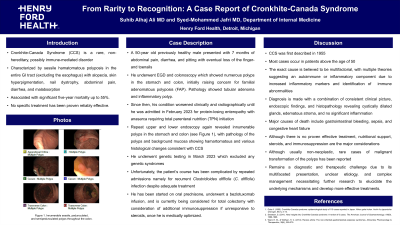Sunday Poster Session
Category: General Endoscopy
P0586 - From Rarity to Recognition: A Case Report of Cronkhite-Canada Syndrome
Sunday, October 22, 2023
3:30 PM - 7:00 PM PT
Location: Exhibit Hall

Has Audio

Suhaib Alhaj Ali, MD
Henry Ford Hospital
Detroit, MI
Presenting Author(s)
Suhaib Alhaj Ali, MD1, Syed-Mohammed Jafri, MD2
1Henry Ford Hospital, Detroit, MI; 2Henry Ford Health System, Detroit, MI
Introduction: Cronkhite-Canada Syndrome (CCS) is a rare, non-hereditary disorder characterized by hamatomatous polyposis in the entire GI tract (excluding the esophagus) with alopecia, skin hyperpigmentation, nail dystrophy, abdominal pain, & malabsorption. It is associated with a five-year mortality up to 55% with no specific reliably effective treatment.
Case Description/Methods: A 50-year old male presented with 7 months of abdominal pain, diarrhea, & pitting with loss of the finger- & toenails. He underwent EGD & colonoscopy which showed numerous polyps in the stomach & colon, initially raising concern for familial adenomatous polyposis. Pathology showed tubular adenoma & inflammatory polyp. Since then, his condition worsened clinically & radiographically until admission in February 2023 for protein-losing enteropathy with anasarca requiring total parenteral nutrition. Repeat upper & lower endoscopy again revealed innumerable polyps in the stomach & colon, with polyp & background mucosa pathology showing hamartomatous & various histological changes of CCS. He underwent genetic testing in March 2023 to exclude genetic syndromes. Unfortunately, his course has been complicated by repeated admissions namely for recurrent Clostridioides difficile infection despite adequate treatment. He has been started on oral prednisone, underwent a bezlotuxomab infusion, & is currently being considered for total colectomy, with possible additional immunosuppression if unresponsive to steroids, once medically stable.
Discussion: CCS was first described in 1955 by Leonard W. Cronkhite Jr. & Wilma J. Canada. Most cases occur in patients above 50. The exact cause is believed to be multifactorial, with possible autoimmune or inflammatory component due to increased inflammatory markers & identification of non-definitive immune abnormalities. Diagnosis is made with consistent clinical picture, endoscopic findings, & histopathology revealing cystically dilated glands, edematous stroma, & minimal inflammation. Major causes of death include gastrointestinal bleeding, sepsis, & congestive heart failure. Although there is no proven effective treatment, therapy usually consists of nutritional support, steroids, & immunosuppression. Although often non-neoplastic, rare cases of malignant transformation have been reported. Our patient illustrates the need for additional studies investigating the underlying pathophysiology & appropriate management for CCS.
Disclosures:
Suhaib Alhaj Ali, MD1, Syed-Mohammed Jafri, MD2. P0586 - From Rarity to Recognition: A Case Report of Cronkhite-Canada Syndrome, ACG 2023 Annual Scientific Meeting Abstracts. Vancouver, BC, Canada: American College of Gastroenterology.
1Henry Ford Hospital, Detroit, MI; 2Henry Ford Health System, Detroit, MI
Introduction: Cronkhite-Canada Syndrome (CCS) is a rare, non-hereditary disorder characterized by hamatomatous polyposis in the entire GI tract (excluding the esophagus) with alopecia, skin hyperpigmentation, nail dystrophy, abdominal pain, & malabsorption. It is associated with a five-year mortality up to 55% with no specific reliably effective treatment.
Case Description/Methods: A 50-year old male presented with 7 months of abdominal pain, diarrhea, & pitting with loss of the finger- & toenails. He underwent EGD & colonoscopy which showed numerous polyps in the stomach & colon, initially raising concern for familial adenomatous polyposis. Pathology showed tubular adenoma & inflammatory polyp. Since then, his condition worsened clinically & radiographically until admission in February 2023 for protein-losing enteropathy with anasarca requiring total parenteral nutrition. Repeat upper & lower endoscopy again revealed innumerable polyps in the stomach & colon, with polyp & background mucosa pathology showing hamartomatous & various histological changes of CCS. He underwent genetic testing in March 2023 to exclude genetic syndromes. Unfortunately, his course has been complicated by repeated admissions namely for recurrent Clostridioides difficile infection despite adequate treatment. He has been started on oral prednisone, underwent a bezlotuxomab infusion, & is currently being considered for total colectomy, with possible additional immunosuppression if unresponsive to steroids, once medically stable.
Discussion: CCS was first described in 1955 by Leonard W. Cronkhite Jr. & Wilma J. Canada. Most cases occur in patients above 50. The exact cause is believed to be multifactorial, with possible autoimmune or inflammatory component due to increased inflammatory markers & identification of non-definitive immune abnormalities. Diagnosis is made with consistent clinical picture, endoscopic findings, & histopathology revealing cystically dilated glands, edematous stroma, & minimal inflammation. Major causes of death include gastrointestinal bleeding, sepsis, & congestive heart failure. Although there is no proven effective treatment, therapy usually consists of nutritional support, steroids, & immunosuppression. Although often non-neoplastic, rare cases of malignant transformation have been reported. Our patient illustrates the need for additional studies investigating the underlying pathophysiology & appropriate management for CCS.
Disclosures:
Suhaib Alhaj Ali indicated no relevant financial relationships.
Syed-Mohammed Jafri: Gilead, Takeda, Abbvie – Advisor or Review Panel Member, Speakers Bureau.
Suhaib Alhaj Ali, MD1, Syed-Mohammed Jafri, MD2. P0586 - From Rarity to Recognition: A Case Report of Cronkhite-Canada Syndrome, ACG 2023 Annual Scientific Meeting Abstracts. Vancouver, BC, Canada: American College of Gastroenterology.
